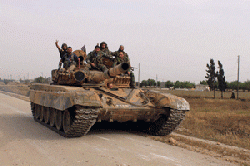The United States, on Wednesday, demanded the immediate withdrawal of Hizbullah fighters from Syria, saying their active role in combat there was an “extremely dangerous escalation.”
“This is an unacceptable and extremely dangerous escalation. We demand that Hizbullah withdraw its fighters from Syria immediately,” State Department spokeswoman Jen Psaki said.
Hizbullah leader Sayyed Hasan Nasrallah confirmed last week that the group was actively fighting on the side of its close ally, Syria’s President Bashar Assad, in the Syrian town of Qusair near the border.
Hizbullah had long insisted its arsenal of rockets and other weapons would only be used to defend Lebanon from its southern neighbor, Israel.
But Nasrallah has said the group must now defend Assad’s regime against an uprising increasingly dominated by hostile, hardline Islamists.
Syria Troops, Hizbullah Bolster Qusair Fighters
Meanwhile, according to reports from the battlefield in Qusair on Wednesday, the Syrian elite forces and additional Hizbullah fighters have been sent to reinforce government troops battling rebels in that strategic border town.
Government fighter jets early Wednesday bombed rebel zones of the town as regime forces readied to launch a major assault, according the Syrian Observatory for Human Rights.
Hizbullah fighters and crack troops of Syria’s elite Republican Guards had been sent to reinforce government ranks, Observatory Chief Rami Abdul Rahman told Agence France Presse.
Like Hizbullah’s fighters, the Republican Guards have been trained in urban guerrilla warfare, he said.
A source close to Hizbullah has said 80 percent of Qusair is now under the Syrian government control.
“Despite the intense bombardment, the rebels are resisting fiercely,” Abdul Rahman said.
He added that Sunni militiamen from Lebanon had joined the battle on the side of the rebels.
Control of Qusair is essential for the rebels as it is their principal transit point for weapons and fighters from across the border in Lebanon.
It is also strategic for the regime because it is located on the road, linking Damascus with the coast, its rear base.
“If Qusair was not strategic the rebels would not be fighting to the death and the regime and Hizbullah would not have brought in their heavyweights,” Abdul Rahman added.

Assad says anti-air missiles have arrived from Russia
Syria has received the first shipment of a sophisticated air defense system from Russia, President Bashar al-Assad was quoted as saying in a recent Lebanese television interview.
Russia had promised delivery of the S-300 missile system to the Syrian government despite Western objections, saying the move would help stabilize the regional balance at a time of insurgency in Syria waged by Western-backed rebels.
“Syria has received the first shipment of Russian anti-aircraft S-300 rockets,” Lebanese newspaper al-Akhbar newspaper quoted Assad as saying in an interview due to be broadcast later on Thursday.
More of the missiles would arrive soon, he was quoted as saying.
A source close to Russia’s Defense Ministry said there had been a “bank transfer” in connection with the S-300 transaction but that Russian banks were becoming increasingly nervous about dealing with Assad.
It was reported by Reuters on Thursday night that another source close to the Russian defense ministry said the missiles had yet to arrive, however. The missiles could be used to deter any possible no-fly zone that could be set up in Syrian airspace.
The United States, France and Israel have all called on Russia to stop the missile delivery.
Al-Akhbar said Assad also stressed ties between his forces and Hizbullah fighters now openly fighting on the Syrian side of the Lebanese-Syrian frontier. “Syria and Hizbullah are part of the same axis,” al-Akhbar quoted him as telling al-Manar.
“The Syrian army is the one fighting and leading the battles against the armed group, and this fight will continue until all those who are called terrorists are eliminated.”
Israel, wary of any Syrian weapons being sent to Hizbullah in Lebanon, has already carried out three air strikes against Damascus to stop suspected transfers.
A recent series of strikes in Damascus, which shook the entire capital, stoked an angry reaction from Syria. State media outlets said Syria would respond to any further attacks.
Syria says will attend Geneva talks “in principle,” rebels to boycott
Syria’s government will “in principle” attend multilateral talks planned for June 15-16 in Geneva and believes the conference will be an opportunity to resolve the country’s conflict, Syrian Foreign Minister Walid al-Moualem said on Sunday.
Russia and the United States are sponsoring a proposed peace conference planned for next month on the war, which has killed 80,000 people and risks spilling over its borders and stirring regional sectarian violence.
On Thursday, Syria’s main opposition group said it would not take part in the proposed talks as the civil war rages in Syria, according to a statement from opposition acting chief George Sabra in Istanbul. He also called on Lebanese President Michel Sleiman to stop Hizbullah from aiding Assad’s troops.
Poll: Most Americans against Syria intervention
A new poll conducted by Fox News from May 18-20 found that about 68 percent of people surveyed opposed U.S. military intervention in Syria and also said that Washington should not get more involved in the Middle Eastern country’s internal affairs.
Respondents said the risk of supporting extremist, potentially anti-American groups fighting President Bashar al-Assad’s regime could be harmful in the long run.
Only 23 percent of those surveyed said that they supported U.S. military intervention in Syria.
Assad said on May 18 that militants from 29 different countries were involved in the fighting against his regime.
– Reuters, TAAN, Al-Akhbar, UPI






Leave a Reply